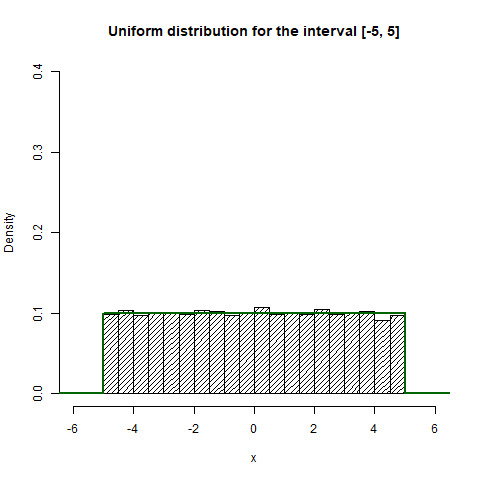runif()R語言中的函數用於創建均勻分布的隨機偏差。
用法: runif(n, min, max)
參數:
n:表示觀察次數
min, max:表示分布的下限和上限
範例1:
# Create uniform distribution between range -1 to 1
x <- runif(20, min = -1, max = 1)
# Print distibution
print(x)輸出:
[1] 0.90453974 -0.97083088 0.83531295 0.19008941 0.52278078 -0.75730955 [7] 0.21659920 -0.26621211 0.11967620 0.42081991 0.75518470 -0.41519833 [13] -0.03734007 0.57365077 0.76156708 0.97314141 -0.41957919 -0.08910355 [19] 0.29047038 -0.67069856
範例2:
# Create uniform distribution of range -5 to 5
unif <- runif(10000, min = -5, max = 5)
# Output to be present as PNG file
png(file = "runifGFG.png")
# Create Histogram
hist(unif, freq = FALSE,
xlab = 'x',
ylim = c(0, 0.4),
xlim = c(-6, 6),
density = 20,
main = "Uniform distribution for the interval [-5, 5]")
# Show density of distribution using curve
curve(dunif(x, min = -5, max = 5),
from = -10, to = 10,
n = 100000,
col = "darkgreen",
lwd = 2,
add = TRUE,
yaxt = "n",
ylab = 'probability')
# Saving the file
dev.off()輸出:
相關用法
- R語言 qunif()用法及代碼示例
- R語言 punif()用法及代碼示例
- R語言 dunif()用法及代碼示例
- R語言 ecdf()用法及代碼示例
- R語言 pf()用法及代碼示例
- R語言 qf()用法及代碼示例
- R語言 qweibull()用法及代碼示例
- R語言 qtukey()用法及代碼示例
- R語言 qsignrank()用法及代碼示例
- R語言 qwilcox()用法及代碼示例
- R語言 ptukey()用法及代碼示例
- R語言 dsignrank()用法及代碼示例
- R語言 psignrank()用法及代碼示例
- R語言 dwilcox()用法及代碼示例
- R語言 pwilcox()用法及代碼示例
- R語言 dgeom()用法及代碼示例
注:本文由純淨天空篩選整理自utkarsh_kumar大神的英文原創作品 Create Random Deviates of Uniform Distribution in R Programming – runif() Function。非經特殊聲明,原始代碼版權歸原作者所有,本譯文未經允許或授權,請勿轉載或複製。
